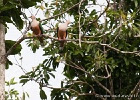SAVE HALMAHERA PRIMARY FOREST
Halmahera Island is the largest Island
in North Maluku, it encompasses the mountainous rain forests. This islands have a high number of endemic
species. Around 38 mammal species, six are endemic to the ecoregion, including
the Bisa rat, masked flying fox, and three species of cuscus--the Moluccan
cuscus, Obi cuscus, and Gebe cuscus. Like kangaroos, cuscuses are marsupials,
and females have pouches to carry their young. Cuscuses are hard to see in the
wild because they live high in trees and move slowly about at night. Many more
bird species than mammals can be found here--215 in all--with 26 species that
are endemic. Four endemics are considered vulnerable: the invisible rail,
caranculated fruit-dove, chattering lorry, Goliath Coucall, Wake tale and white
cockatoo.
As spices Island people here cultivate
Cloves, nutmeg. However, nearly 80 percent of this ecoregion’s native forests
still exist. Extensive blocks of habitat still cover all the islands in the
chain. This is our main concern to protect the primary forest from
deforestation.
Forest exploitation in North Maluku has been
happening by logging company since 1980’s
in Obi Island, Bacan Island, Sula Island, East Halmahera, Morotai,
Centrlal Halmahera and North Halmahera and West Halmahera. However, The rest of
original primary forest still exist in
West Halmahera, which is under control of Tobaru tribe of Ibu sub-district since
their ancestor. It’s not easy to struggle as logging company can get government
permit easily to enlarge their logging activity to the interior.
The impact of logging company is not
only to rise up global warming but more than that is to open an access for the
city community to move to a new place and doing forest clearance for
agriculture purpose. This might be good
for those want to enlarge their property but it will force the tribe to work
hard struggling to change their life from hunting every day and collect food
from their own small permaculture garden to the way of life that fully depend
on money.
ALEX
DJANGU OF TOBARU TRIBE
Alex Djangu is a native Tobaru from
Duono Village Ibu sub-district West Halmahera Regency, he worked with Save the
Children UK in 2003 to 2005 and then teach at an International school and
Community College in Tobelo North Halmahera but finally he found difficult to
share his time on doing teaching job as well as going to the forest with his
tribe friends and uncles to look after the forest and he decided to resign from
his teaching and fully concern on protecting his ancestor forest. He realize
that most of his brothers and folks after finish their bachelor they prefer
living in the city and doing office job as well as being politician and have
lack of nature concerning.
Now he work with his friends and uncle
to promote the West Halmahera Primary forest to the government and global
community to support in protecting the only native forest left in Halmahera
Island in term of policies to change the status of the forest in to
conservation area as well tourism destination to keep the sustainability in
future.
WHAT
ARE INSIDE THE INTERIOR?
1.
Todoke
Lake
2.
Tokuoko
Lake
3.
Peke
Lake
4.
Sika
Lake
5.
Kaleru
Thermal
6.
Tingitio
Thermal
7.
Rugu-rugu
Hot River
8.
Standard
Wing paradise bird, Maleo and other
endemic
9.
Ira
River
10.
Wai
Lamoko River
11.
Mawea
River
12.
Tiabo
River
WHAT DO WE DO FOR PREVENTING DEFORESTATION?
Not everyone in the
world feel happy after damage things belong to him/her, everyone would love to
take care of everything which is belonging to him/her. As a tribe that our
ancestor have being live in Halmahera for a long time, we have sense of
belonging on the nature, forest and everything on it that created by all mighty
God for our needs. We realize that we have responsibility to use it and to take
care for our sustainable life purpose, not to destroy.
In 1999, one of a big
company in Indonesia tried to bring investment by building a palm oil farm for
29000 Ha, it means we have to lose our forest, how many trees will be cut down
to make money? And how much flood disaster will happen for us? How much marine
destruction after land erosion?
That’s make us
struggle to stop them.
Our forest is your
forest, it’s borderless, and we are living in the same globe. Forest
destruction is a global issue.
You want to join us? Support
us to convert the forest into conservation area for a sustainability tourism
destination.
Let’s get contact
Alex Djangu
Phone: 0821 9 123 5467
e-mail:
alex_djangu@yahoo.com
GALERI
West Halmahera Forest
THE TAGUTIL TRIBE IN WANGONGIRA VILLAGE FOTO: IN 1999
AFTER A LOGGING COMPANY BUILT AN ACCESS TO WANGONGIRA VILLAGE, NOW 60 % OF PEOPLE IN THEY'RE VILLAGE ARE FROM THE CITY, THIS MAKE THEM WORKING HARD AND TRYING TO SET UP THEIR LIFE STYLE AS WELL AS CITY PEOPLE, BUT IT'S HARD.
SUPPORT US TO SAVE OUR FOREST












Tidak ada komentar:
Posting Komentar